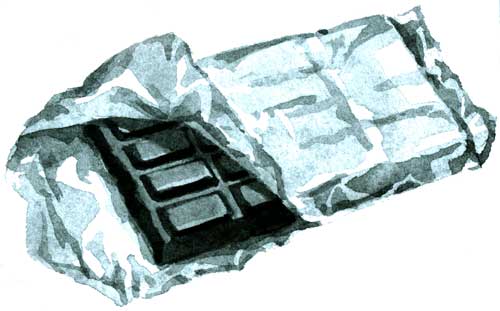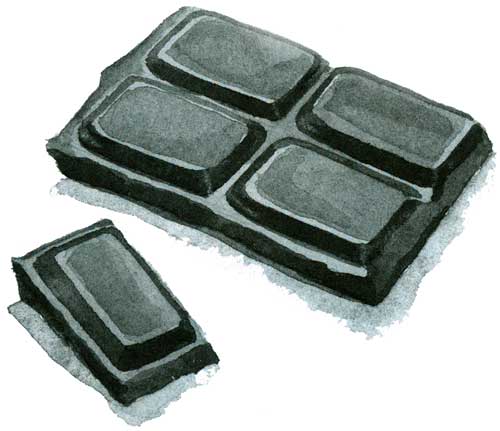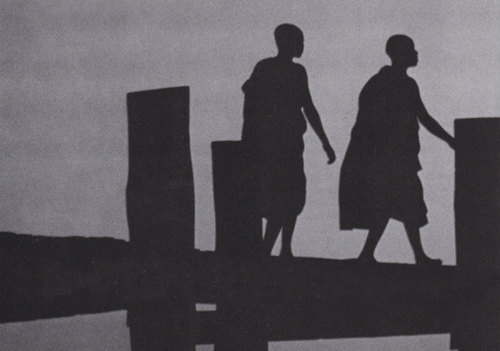In California we would say she had no boundaries. The concept probably doesn’t translate into Burmese, but you get the picture. Her name was Mi Mi May and she was one of the wealthy Burmese people practicing at the monastery. She was in her late twenties, about my age at the time, with long hair that always seemed perfectly combed and styled. She must have spent hours on her hair, which could explain why she was never in the meditation hall. She wore silk brown longyis—the Burmese skirts worn by both women and men—and detailed white cotton blouses. Under the pretense of failing at meditation and trying to occupy her time, she was always in everyone’s business, especially mine. She took a special interest in me, the American nun. I tried to avoid her, but after seven months of intensive meditation, when my practice began its downward spiral and I stopped looking so concentrated, she pounced on me. One day on the path by the lake, once we were well out of the way of the watchful eyes of the Sayadaw (our teacher), she crept up behind me and whispered loudly:
“Your boyfriend, he is leaving soon.”
“He’s not my boyfriend.”
“Yes he is, everyone says he is.”
“I am a nun, he is a monk, how could he be my boyfriend?”
“Well, you won’t be one forever. You came to the monastery together. He is very handsome, a very good boyfriend to have.”
“He’s not my boyfriend!”
“Yes he is. Su will be so jealous.”
“Who?”
“Su, the Taiwanese yogini who stopped practicing because of—how you say?—hemorrhoids. Su is jealous of you because she is in love with your boyfriend.”
“She’s married.”

“Doesn’t matter, she is in love with him.”
“Aren’t you supposed to be meditating? Why are you looking around so much? You notice everything.”
“I cannot help it. My meditation is so bad. I cannot practice, but I do not want to leave. So I have to look around.”
“What’s wrong with your practice?”
“I cannot attain nibbana.”
“Oh?”
“I am very close, very, very close, but I keep falling backwards, and now I cannot even reach ‘arising and passing away.’ I am a terrible yogi, but I cannot leave the monastery either, maybe it will happen another day.”
“Not if you keep talking so much.”
A few days later she cornered me in the shoe room outside the meditation hall.
“Here, Sayalee (Sister). Here is some ramen for you. And some Nescafé.” She stood there, hands outstretched with a neon packet of ramen. I chose to ignore the smug smile. I glanced around to make sure no one was watching and then furtively shoved them into my bag.
“Sayalee, do you like fried chicken and burgers?”
“Well, not hamburgers.”
“No, no, chicken burgers. On buns.”
“Yes, of course I do.” God. I started to fantasize. I hadn’t had something even remotely American-tasting in seven months. “Why?”
“My mother will come this week, and I can ask her to stop at the best burger joint in Yangon (Rangoon) to get chicken and burgers for me and you. What else do you want?”
“Um.” I was well aware that as a nun I wasn’t supposed to express wants. Then the words came tumbling out of my mouth. “Chocolate. I’m dying for chocolate.”
“No problem. Come to my room on Wednesday after lunch.”
Wednesday I ate lightly and knocked equally lightly on her door.
“Mi Mi? Are you there?”
“Oh, my mother did not come today. But please come in, I will give you some Nescafé. I saw you didn’t eat much, and you clinked your spoons so loudly as you ate. Do you know everyone laughs at you? They think it is very funny, because you eat slow and mindful but when you put down your spoon and fork on the side of your plate it goes ping-ping! pong! ding! ping!”
I turned bright red. “Why hasn’t anyone told me this?”
“Oh, I told Sayadaw to tell you, but he said he cannot tell the foreign yogis what to do. I think he is afraid foreigners will not give money when they leave, so he will not be strict with them. He is not very strict with me either. The other day I say, Sayadaw, why do you not give me more strict instruction? If you gave me more strict instruction then I could reach nibbana. Instead you just say, Please keep trying. He got very angry. He say, Mi Mi May, you are not a baby, I am not your father, if you want strict teacher, go see Sayadaw U Dhammajiva. I cry and cry when he say that, how can he be so mean to me? Maybe my parents will stop giving him dana, or take me home.”
“Mi Mi, why don’t you leave? You are barely meditating, you are talking all the time, and you hate it here.”
“Because if I leave, then I won’t be able to reach nibbana. If I don’t reach nibbana I may go to the hell realms, and I scare! I scare!”
“But nibbana could take lifetimes, we don’t know how long it will take. We can’t make nibbana happen.”
“No, I am close. You see, Sayalee, six months ago I came to the monastery to get better concentration to pass my accounting exams. I had never meditated before. I meditate for ten days, and at the end of nine days I reached uddhyabhaya [first stage on the progress of insight: “arising and passing away”]. I was very surprise and very happy. Then Sayadaw-ji, he told me now I have reached uddhya, I can reach nibbana, guaranteed. So I work very hard and go through all the stages of insight, and then I could not go pastsankara upekkha [stage before nibbana]. Every time I almost get there, I scare!! So I cannot. Then I realize it is not my fault, it is too hard to practice in Yangon. I tell Sayadaw-ji I want to leave the city monastery because there are too many old ladies gossiping all day there. I know I can reach nibbana better in the country. In the city I must sleep in one room with snoring old ladies. How can I reach nibbana with all those busybodies talking and snoring instead of meditating? So I asked for my own kuti [meditation hut] in the country, and Sayadaw-ji let me come. Now I have very nice, very private kuti. But I have been here four months and still no nibbana. So I feel so bad and I cannot practice well, so now I talk a little.”

“A little?”
“Okay, a lot. But what else can I do?”
“Close your mouth and practice.”
“You talk too. See, right now you talk to me.”
“I know, but my practice is bad, too.”
“Why?”
I was silent.
“Come on, Sayalee, why is your practice bad?”
I sighed, relieved to have someone to confide in, despite my better judgment. Finally I said, “I have been here seven months and I am also stuck and I cannot reach nibbana, and now I hate myself so much.”
“Me too, I hate myself.”
“We are terrible yogis.”
“Cheer up, Sayalee. My mother will bring burgers on Friday.”
Friday before lunch Mi Mi May walked pseudo-mindfully past me and slipped a note into my nun’s sash. “Be at your kuti at 11:30. Don’t eat too much.” I picked through my lunchtime bowl of the usual greasy vegetables and white rice, my mind hardly present but deeply engrossed in speculations of what a Burmese burger would look like.
11:25. I abandoned all pretense of mindfulness and walked briskly to my kuti.
11:30…35…40. No mother. I knew she was lying. She just wanted to get me to talk to her and be her friend. Aversion, aversion. I was seething.
11:45. I heard rustling outside and voices. I opened my door to four Burmese ladies, all who looked faintly like Mi Mi May, with their bad teeth and fine long dark hair.
“Sayalee Diana?” they inquired.
“Yes, that’s me, please come in.”
They entered my kuti and immediately bowed down three times.
“Mi Mi has told us so much about you. You are from America. You are from which city? We are from Yangon. These are my two sisters, I am Mi Mi’s mother, and this is my niece who does not speak English, and…”
Barely listening, I stared at the white paper bags in front of her and the wafting smell of the promised fried food. And the clock, which was rapidly ticking toward noon. At noon the nun’s no-food vow began. I could eat anything I liked between sunrise and noon, but afterward, for seventeen hours, I would be relegated to hard sucking candy and fruit drinks with no pulp, usually the orange-colored sugar water a British friend had nicknamed “Agent Orange.”
Hmm, I wondered, will I get to eat the burgers before noon? Oh God, please, I just have to get rid of these people. What do they want? A blessing? A photo?
“Umm…” I ventured, “Your daughter is very friendly. Her English is quite good.”
“We want her to come home and finish her accounting exams, but Sayadaw-ji says we must let her stay. She may reach nibbana soon, so we must listen to him.”
“Oh, I see.” 11:55.
“Do you miss America, Sayalee?”
11:56. “Sometimes. But I feel very happy to practice in your country. The Burmese people have been very kind to me.”
11:57. “Our uncle U Maung Thin once went to Dutch. He saw many sights and many—how you say?—windmills. We hope to travel, but our government does not give visas easily. Oh dear, it is getting late and we must go, and you must want to eat your burgers and chicken.”
I smiled weakly. The clock said twelve o’clock. I was sunk.
“Well, thank you, Sayalee, for being friends with our daughter and practicing in our country. When you leave the monastery you must come visit us and stay in our home. We will cook you many delicious meals like noodles and fish soup, and we can go into Yangon to a very special donut shop. And you can meet our cousins and aunties and uncle who has also gone abroad. Do you like windmills? Please consider us your family here in Burma. You are our new daughter. Anything you need, please do not hesitate. Well, we must go now. Please do not forget us. Here is our address.”
In their tiny curved handwriting they painstakingly wrote out their address. They bowed three times upon leaving, and my face flushed. It was well past noon.
As I waved goodbye to them from my deck, my next thoughts turned to the bags.
Unmindfully, I rushed inside and tore them open. Next to two giant bars of already melting chocolate were what had to be the scrawniest looking fried chicken drumsticks I had ever seen, jammed onto a stick like a corn dog. Repulsed, I ripped open the other bag, unwrapped the sandwiches, and burst into tears. In my hand I held a facsimile of the West: a chicken “burger” on a “sesame seed bun,” topped with what passed for cheese, lettuce, tomatoes, onions, mustard, mayo, and cucumbers masquerading as pickles. Screw the vow, I announced to no one in particular. Tears streamed down my cheeks. I bit into the burger. The taste of the nearly-familiar slid down my throat as I devoured the chunks. I had never before broken my food vow. As I chewed in great greedy bites I sobbed for missing my country and ordinary food and for wanting to be normal again. I cried, thinking, I’ll never reach nibbana at this rate, I can barely keep my nun’s vows, I’m a horrible failure and a horrible nun. Well, I consoled myself, maybe I’ll just quit practicing and stay with Mi Mi’s family, then at least I’d get nice things to eat. Except, of course, the government arrests people who bring foreigners into their homes. Oh my God, I’m so self-centered, here I am in the middle of Burma with its draconian military dictatorship and all I can think about is how miserable I am. This started a fresh spate of crying. Suddenly my stomach lurched. I rushed into the bathroom, began retching, and threw it all up. Afterwards, as I rinsed my mouth out, I wondered whether since I had vomited it meant I hadn’t broken the food vow.
I hung the remaining chicken burgers from the rafters so the ants and rats wouldn’t eat them. Within a day they were moldy and I had to throw them out. The chocolate melted immediately in the heat. And as for the chicken dogs, I gave them to a ten-year-old boy who worked at the monastery.
Thank you for subscribing to Tricycle! As a nonprofit, we depend on readers like you to keep Buddhist teachings and practices widely available.
